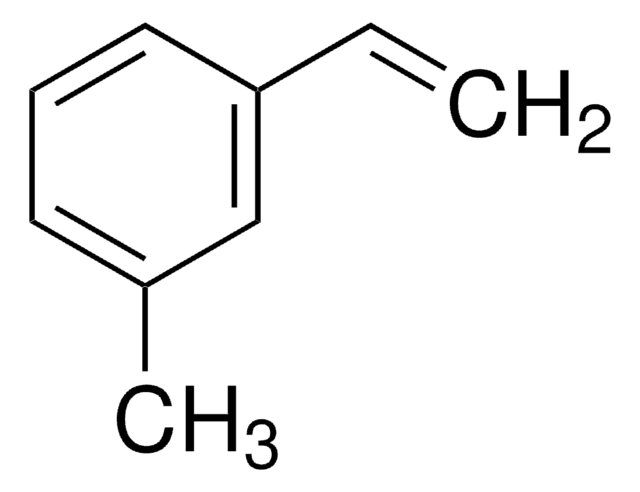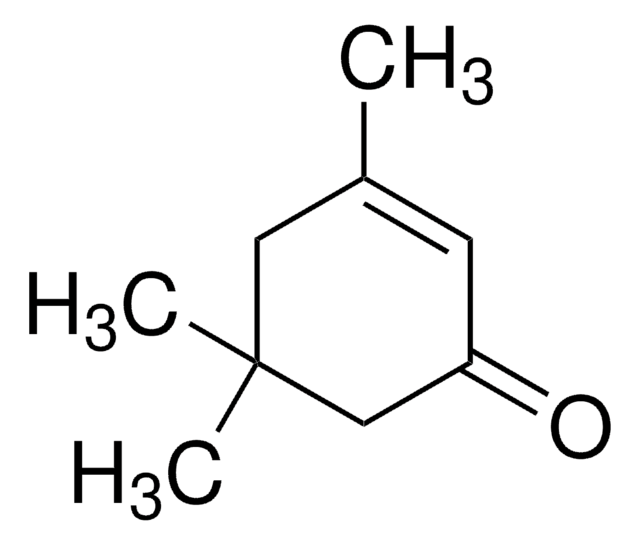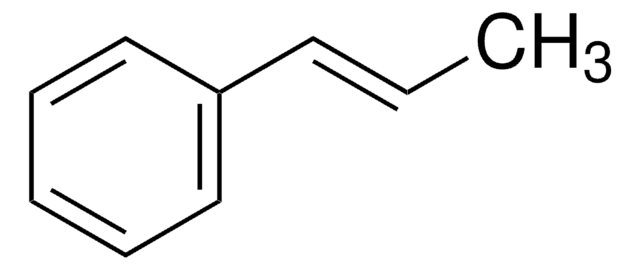69180
2-Methylstyrene
≥95.0% (GC)
Synonym(s):
2-Vinyltoluene
Sign Into View Organizational & Contract Pricing
All Photos(1)
About This Item
Empirical Formula (Hill Notation):
C9H10
CAS Number:
Molecular Weight:
118.18
Beilstein:
1901764
EC Number:
MDL number:
UNSPSC Code:
12352100
PubChem Substance ID:
NACRES:
NA.22
Recommended Products
Quality Level
Assay
≥95.0% (GC)
form
liquid
refractive index
n20/D 1.543
bp
169-171 °C
density
0.914 g/mL at 20 °C
storage temp.
2-8°C
SMILES string
Cc1ccccc1C=C
InChI
1S/C9H10/c1-3-9-7-5-4-6-8(9)2/h3-7H,1H2,2H3
InChI key
NVZWEEGUWXZOKI-UHFFFAOYSA-N
Looking for similar products? Visit Product Comparison Guide
Signal Word
Warning
Hazard Statements
Precautionary Statements
Hazard Classifications
Acute Tox. 4 Inhalation - Aquatic Chronic 2 - Flam. Liq. 3
Storage Class Code
3 - Flammable liquids
WGK
WGK 2
Flash Point(F)
136.4 °F - closed cup
Flash Point(C)
58 °C - closed cup
Personal Protective Equipment
dust mask type N95 (US), Eyeshields, Gloves
Choose from one of the most recent versions:
Already Own This Product?
Find documentation for the products that you have recently purchased in the Document Library.
Customers Also Viewed
Yasuhito Suzuki et al.
Forensic science international, 278, 228-239 (2017-08-02)
Various autopsy findings are used for the diagnosis of burning death, including inhalation injury, soot in the respiratory tract, vital reaction, blood carboxyhemoglobin (COHb), and blood cyanide. However, not all findings are necessarily complete, and autopsy diagnosis can be difficult
T Kühler
Xenobiotica; the fate of foreign compounds in biological systems, 14(5), 417-428 (1984-05-01)
N-Acetyl-L-cysteine was reacted with 2-(2-, 3-, or 4-methylphenyl)-oxiranes to give mixtures of the two possible regio isomers N-acetyl-S-[1-(2-, 3-, or 4-methylphenyl)-2-hydroxyethyl]-L-cysteine and N-acetyl-S-[2-(2-, 3-, or 4-methylphenyl)-2-hydroxyethyl]-L-cysteine, respectively. These were isolated in pure form by h.p.l.c.. The diastereomers were characterized by
Our team of scientists has experience in all areas of research including Life Science, Material Science, Chemical Synthesis, Chromatography, Analytical and many others.
Contact Technical Service













